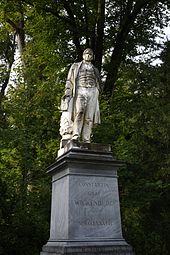Matthias Constantin Capello von Wickenburg


Matthias Constantin Capello Count von Wickenburg (born July 16, 1797 in Pesch near Düsseldorf , † October 26, 1880 in Gleichenberg ) was an Austrian statesman.
origin
He was the son of the Electoral Palatinate-Bavarian general and envoy to the courts of St. Petersburg and Vienna , Anton Anselm Capellini von Wickenburg (1750-1813), a grandson of the privy councilor Johann Franz Capellini von Wickenburg (1677-1752). The founder of the noble family was its father Francesco Maria Capellini von Wickenburg, called Stechinelli (1640–1694), postmaster general and court banker of the Guelph duchies.
His mother Lucia Maria geb. von Hallberg (1765–1823) was the daughter of the Electoral Palatinate-Bavarian ambassador Heinrich Theodor von Hallberg (1725–1792).
Life
Matthias Constantin came to Vienna with his father at an early age, where he attended high school and university. He decided to enter the civil service and made an amazing, fast career here. His first positions were in the Lower Austrian provincial government and the general court chamber in Vienna. In 1823 he was appointed by the emperor to the real court secretary of the united court chamber, in 1824 to the Lower Austrian government council and in 1825 to the district chief of the Ober dem Manhartsberg district.
In 1830 he was appointed Vice President of the Gubernium of Styria. In 1835 he was appointed governor of the Duchy of Styria and a real privy councilor . In this function he developed a beneficial activity for Styria. The Judenburg , devastated by fire , was rebuilt under his leadership. In Graz he had two chain bridges built over the Mur and the monument to Emperor Franz erected. The cities of Graz and Judenburg granted him honorary citizenship .
He achieved particular merits by founding the spa town of Bad Gleichenberg . He founded the parish church of St. Matthias and the adjacent Franciscan hospice . The grateful city erected a monument to him in 1887.
In 1843 the 21st meeting of German naturalists and doctors took place in Graz. Together with Archduke Johann, he made a significant contribution to the success of this important event .
The revolutionary year of 1848 turned out to be fateful for him. In the first few months he managed to keep calm in Styria. He made a living by recruiting and equipping a volunteer battalion that was sent to Italy . In October he gave in to death threats from rioters, which unjustly smelled disloyalty and ultimately led to his release. His departure was deeply regretted in Styria. In 1850 he settled in Vienna and waited for his rehabilitation. At the end of the 1950s he was elected President of the Board of Directors of the Kaiserin-Elisabeth-Westbahn . In 1861 he was in the Cabinet Schmerling as trade minister appointed. In this capacity he became President of the Vienna City Expansion Commission. In 1863 he resigned and was appointed a lifelong member of the manor . He was also a member of the building committee for the new kk Hofoperhaus . He was made an honorary citizen by the Vienna City Council.
He was married to Emma Countess Orsay since 1829. This marriage resulted in two sons and three daughters.
In 1809, Wickenburggasse in Vienna- Josefstadt (8th district) was named after his father, the Electoral Palatinate-Bavarian envoy Anton Reichsgraf Wickenburg.
literature
- Constantin von Wurzbach : Wickenburg, Matthias Constantin Capello Graf . In: Biographisches Lexikon des Kaiserthums Oesterreich . 55th part. Kaiserlich-Königliche Hof- und Staatsdruckerei, Vienna 1887, pp. 228–232 ( digitized version ). (Scans from p. 228 and p. 229 incorrectly assigned to volume 56)
- Franz Ilwof : Wickenburg, Matthias Constantin Capello Count of . In: Allgemeine Deutsche Biographie (ADB). Volume 42, Duncker & Humblot, Leipzig 1897, pp. 320-325.
| personal data | |
|---|---|
| SURNAME | Capello von Wickenburg, Matthias Constantin |
| BRIEF DESCRIPTION | Austrian statesman |
| DATE OF BIRTH | July 16, 1797 |
| PLACE OF BIRTH | Pesch near Düsseldorf |
| DATE OF DEATH | October 26, 1880 |
| Place of death | Gleichenberg |
